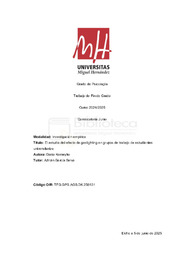Por favor, use este identificador para citar o enlazar este ítem:
https://hdl.handle.net/11000/37013Registro completo de metadatos
| Campo DC | Valor | Lengua/Idioma |
|---|---|---|
| dc.contributor.advisor | García Selva, Adrián | - |
| dc.contributor.author | Korneyko, Daria | - |
| dc.contributor.other | Departamentos de la UMH::Psicología de la Salud | es_ES |
| dc.date.accessioned | 2025-07-29T08:23:03Z | - |
| dc.date.available | 2025-07-29T08:23:03Z | - |
| dc.date.created | 2026-06 | - |
| dc.identifier.uri | https://hdl.handle.net/11000/37013 | - |
| dc.description.abstract | El término de gaslighting hace referencia a una forma de abuso psicológico cuya característica principal es hacer dudar al individuo acerca del discernimiento y las capacidades del mismo, conllevando a la distorsión de la realidad de la persona y de su cordura. A pesar del incremento del interés hacia el estudio del tema, apenas existen una conceptualización y medición claras de dicho fenómeno en el ámbito académico universitario. En base a ello, el objetivo de esta investigación es estudiar el efecto de gaslighting en los grupos de trabajo de universitarios a través de sus dos facetas (gaslighting trivialización y gaslighting aflicción) y su relación con otras variables: cohesión grupal, autoestima, actitudes hacia el trabajo en equipo y self-doubt. Método: La muestra del estudio estuvo compuesta por 89 estudiantes universitarios (52,8% mujeres). Resultados: Cohesión grupal influyó negativa y significativamente sobre las dimensiones trivialización y aflicción (β = -.532; β = -.567). Por otro lado, la dimensión trivialización de gaslighting y cohesión grupal mostraron tener influencia significativa sobre la actitud hacia el trabajo ene quipo (β = -.285; β =.449). Al mismo tiempo, se detectó influencia significativa entre las variables antecedentes: negativa en el caso de autoestima hacia el self-doubt (β = -.792) y positiva en el caso de amistad hacia la cohesión grupal (β = .436), siendo amistad covariable del modelo. | es_ES |
| dc.description.abstract | Gaslighting is a form of psychological abuse that undermines individuals’ confidence in their judgment, distorting their perception of reality. Although interest in the topic has grown, it remains underdefined and undermeasured in academic research. This study investigates the effects of gaslighting in university student work groups, focusing on two dimensions-trivialization and affliction-and their relationship with group cohesion, self-esteem, teamwork attitudes, and self-doubt. Method: The study sample consisted of 89 university students (52.8% women). Results: Group cohesion has a significant negative effect on trivialization and affliction dimensions (β = -.532; β = -.567). Trivialization and cohesion influenced significantly teamwork attitudes (β = -.285; β =.449). Self-esteem negatively predicted self-doubt (β = -.792), while friendship positively predicted group cohesion (β = .436), with friendship included as a covariate. | es_ES |
| dc.format | application/pdf | es_ES |
| dc.format.extent | 26 | es_ES |
| dc.language.iso | spa | es_ES |
| dc.publisher | Universidad Miguel Hernández de Elche | es_ES |
| dc.rights | info:eu-repo/semantics/openAccess | es_ES |
| dc.rights | Attribution-NonCommercial-NoDerivatives 4.0 Internacional | * |
| dc.rights.uri | http://creativecommons.org/licenses/by-nc-nd/4.0/ | * |
| dc.subject | gaslighting | es_ES |
| dc.subject | trabajo de equipo | es_ES |
| dc.subject | self-doubt | es_ES |
| dc.subject | autoestima | es_ES |
| dc.subject | estudiantes de universidad | es_ES |
| dc.subject.other | CDU::1 - Filosofía y psicología::159.9 - Psicología | es_ES |
| dc.title | El estudio del efecto de gaslighting en grupos de trabajo de estudiantes universitarios | es_ES |
| dc.type | info:eu-repo/semantics/bachelorThesis | es_ES |

Ver/Abrir:
Korneyko Daria.pdf
919,6 kB
Adobe PDF
Compartir:
 La licencia se describe como: Atribución-NonComercial-NoDerivada 4.0 Internacional.
La licencia se describe como: Atribución-NonComercial-NoDerivada 4.0 Internacional.
Herramientas de Administrador
.png)